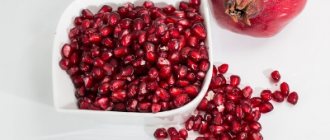Content
1. How is pulp useful for a dog’s body? 2. Is it harmful and what is it? 3. Is it possible to feed with peels and seeds 4. Are there any contraindications 5. In what quantities can animals be fed with watermelon pulp 6. Video: 7. Conclusion
In summer, watermelons appear in stores and markets. Our compatriots really like this sweet and juicy berry. Small children, adults, and elderly people eat this juicy fruit with pleasure, receiving a lot of positive emotions. At the same time, it provides a positive effect on the functioning of internal organs.
What about our four-legged friends? Many dog owners wonder: is it possible to feed a dog watermelon? Does a responsible pet owner know? Tidbits can be given to the dog only if there are guarantees of safety for the animal. It is also desirable that there be some benefit from the use!
Benefit
Let's start with the fact that watermelon is a berry, not a fruit, as is often thought. For people, this product is extremely useful and in some ways even irreplaceable : it contains many minerals, vitamins and proteins: carotene, pectins, iron, phosphorus, potassium, calcium.
For people
Watermelon will be useful for people due to its diuretic properties, which appear due to the presence of potassium salts in it. If you regularly eat watermelon in the summer, you can achieve effective cleansing of the kidneys , preventing the formation of stones in them and removing existing sand. Watermelon also contains folic acid - it, in combination with iron, has a beneficial effect on hematopoietic processes and normalizes hemoglobin in the blood.
The berry also stimulates metabolism, so it will be useful for weight loss . Eating it will also have a positive effect on the liver: this berry is used in the treatment of cholecystitis, hepatitis, and biliary tract diseases.
And that's not all: watermelon even helps fight cancer ! Indeed, this healthy berry contains lycopene, a substance that inhibits the growth of cancer cells.
So, as soon as ripe watermelons appear on the market, be sure to purchase at least a couple - this, as we found out, is very useful .
And friendly eating of watermelon and spitting out the seeds usually brings the family closer together - it’s so nice to eat the sugary cold pulp in the heat and admire your favorite faces, smeared with juice, but still happy!
Even your pet will not remain indifferent - soon after cutting the watermelon you will hear whining: he, too, clearly needs a treat!
For animals
Before you treat your dog to anything new, you should listen to the opinion of a veterinarian. Don't worry: in this situation, all reputable veterinarians agree that watermelon is completely safe for dogs . Even those dogs that usually eat dry food, as well as those that are currently taking any veterinary medications, can eat it.
The fresh, sweet pulp can be given as a treat, as a training reward, as a daily dose of fruits and vegetables for all dogs, and as a cure for constipation.
Just like in humans, watermelon for dogs normalizes and improves kidney function. If there is sand in the animal's kidneys, watermelon will help get rid of it without leading to stones. Even if the dog is healthy, the berry should be given as a preventative wash .
Watermelon is also a rich source of fiber and glucose , which should enter the body in moderate portions - exactly the same as the berry.
But as a source of calcium and phosphorus , although these are useful macroelements and are contained in watermelon, it is better to choose another food: there are too few of them in the berry.
What are the benefits of pulp for a dog’s body?
The pulp contains a huge amount of useful minerals, protein products and vitamin complexes:
- carotene and iron;
- potassium and calcium;
- phosphorus.
One of the most important properties of watermelon is diuretic. It is provided due to the presence of potassium salts in the composition of the substance. With regular use during the summer, you can ensure the normalization of kidney function, cleanse them of accumulated sand, and protect against urolithiasis. Folic acid - this microelement has a positive effect, normalizing the quality of blood, restoring optimal hemoglobin levels.
Is there any harm and what?
If you are planning to feed your dog this treat for the first time, consult your veterinarian. The opinion of experts here is clear: feeding your dog watermelon is both possible and necessary. But with certain restrictions:
- First of all, no peeling.
- Secondly, minimize the number of seeds that can enter the esophagus along with the pulp.
- Thirdly, there should be moderation in everything!
In general, such sweetness can be introduced into the diet even if the animal eats exclusively dry food. There will be no harm! Experts recommend giving juicy, ripe pulp only as an incentive, a treat that the dog deserves after training, for example. The volumes should not exceed the standard daily intake of fruits and vegetables for the dog. Of course, taking into account the volume and body weight of the individual. Meat and cereals are the main diet for a normal dog, and everything else is tasty and sometimes healthy supplements!
Caution: the pulp of the berry contains a fairly large amount of fructose. You should understand: the sweet, juicy pulp has a high concentration of fructose. The pet's body is built in such a way that it does not digest sugar. The accumulation of excess can impair blood quality. So give this yummy to your dog occasionally and know when to stop! Other diseases for which consumption of sweet pulp is contraindicated:
- hypertension,
- diabetes,
- urolithiasis disease.
How to choose a watermelon and determine that it contains no harmful additives
You need to choose watermelon for yourself and your pet during the season when these fruits contain a maximum of useful substances and a minimum of harmful fertilizers and nitrates. The watermelon season usually begins at the end of August and lasts until the end of September.
Watermelons that are too big and beautiful are not always of high quality and tasty. It is better to take a small, medium-sized, imperfectly shaped one. Check to see if it has a dry tail, possibly yellow and white spots, which indicates good ripeness.
Is it possible to feed peels and seeds?
Giving your pet watermelon rinds is strictly prohibited. Various harmful microorganisms can accumulate on the surface, nitrates and other toxic substances can persist. The composition of the solid part of the berry itself is completely useless. At the same time, sharp bits can cause injury to the esophagus.
Before feeding, cut the ripe pulp into small slices or cubes and carefully remove the seeds. Giving seeds is not recommended; carcinogens can also accumulate in them!
You can be poisoned by a product in two cases:
| First | Exceeding the permissible norm of nitrates. |
| Second | Unripe or overripe, spoiled berries in which harmful carcinogens have accumulated. |
At the first symptoms of poisoning, do the following:
- We rinse the stomach. Give plenty of fluids, as much warm water as possible. You can make a weak solution of potassium permanganate.
- On the recommendation of the veterinarian, we give sorbent. Usually it is activated carbon. The dosage is easy to calculate: 1 tablet per 10 kg of body weight.
If the situation has not stabilized within 24 hours, immediately consult a veterinarian!
Can watermelon be included in a dog's diet?
Be that as it may, the dog’s diet should mainly consist of meat, grains and vegetables. Moreover, if you feed your pet with ready-made food, then vitamin supplements are also available in pet stores and pharmacies in the form of granules. When feeding natural foods, vitamins can be given in the form of fresh vegetables and fruits. It is important to know which of them are allowed to be given, and which ones it is absolutely better to refuse.
As for watermelon, all dog breeders and veterinarians agree that this miracle berry can be given, but it’s better not to make it part of the diet. Ask why? The answer is simple: watermelon, like any other berry, fruit or vegetable, is an unnatural product for an animal. And therefore, in the summer it is possible, and even necessary, to give fresh, juicy and ripe pulp without seeds and crusts. Only it is necessary to feed watermelon (and other products of this type) correctly.
Possible consequences and contraindications
The most logical consequence after eating the red ripe pulp is the desire to go to the toilet as often and as much as possible. Therefore, the owner must be ready to take the dog outside soon after feeding the pet a juicy berry, otherwise he risks noticing a couple of puddles on the floor. The dog is eating a watermelon - get your leash and collar ready!
Sorry, there are no surveys available at this time.
We can conclude that watermelon activates kidney function. In addition, it is an inexhaustible source of fiber and glucose, which should be supplied to the body in limited portions. Under no circumstances should you give pieces of berries along with crusts and seeds. This can lead to damage to the mucous membranes and serious digestive problems.
Contraindications to the use of watermelon apply to animals that:
- the outflow of urine is impaired;
- there is constant diarrhea;
- pancreatitis;
- Large stones were found in the kidneys.
In addition, before feeding this berry (and vegetables) to dogs, you should check them for the presence of nitrates. This is done simply: you need to put a piece of pulp in a glass of cold boiled water. If the water just turns cloudy, that's a good sign. Well, if it turns pink, then the product most likely contains chemicals and therefore it is better not to feed them to the dog, and to limit yourself too.
For what diseases should you strictly protect your pet from watermelon?
It is known that a good watermelon can have a positive effect on the human body, and animals too. And if the pet really asks, then there is no particular reason to deny him a treat. Unless your dog is sick... What should you pay attention to?
Preliminarily take a urine test and, if possible, do an ultrasound of the kidneys. If sand is found in them, the watermelon will be able to “drive” it out. But it will not cope with stones, and may even cause harm. The same can happen if the dog suffers from gastrointestinal diseases. Frequent disorders, especially diarrhea, are not compatible with juicy berries.
It is not recommended to give watermelon to small puppies (up to three months old), since their bodies are still weak and fragile. After a year, dogs can be given ripe pulp, but in strictly limited quantities. If you have flatulence and diabetes, it is better to protect your pet from eating this treat.
Are there any contraindications
Making watermelon the culprit for any diseases in your pet is stupid and pointless. It is necessary to undergo regular examinations by a veterinarian, maintain a balanced diet and daily routine, and receive all required vaccinations in a timely manner. This will avoid most of the dog’s health complications.
Of course, it is theoretically possible to get poisoned by watermelon. The first reason is a low-quality product. A mass stuffed with nitrates will not benefit anyone, including the fragile digestion of your four-legged friend. So, who should not be given (or is not recommended) watermelon:
- pregnant animals;
- small puppies;
- patients with pancreatitis;
- if there are large diameter stones in the kidneys;
- individuals suffering from diseases of the genitourinary system.
Well, about overeating: follow the recommendations of veterinarians. Experts advise moderation in everything. Including when eating watermelon.
Possible consequences and contraindications
Watermelons in the wild are unlikely to attract the attention of predators. However, if a dog lives in a person’s house, then, in addition to bones and meat, its diet will contain fruit and berry components to obtain vitamins. The benefits of watermelon are undeniable, which is why the answer to the question, can a Jack Russell eat watermelon, is definitely positive. But it is important to remember the following consequences:
- The diuretic effect of the berry is a reason to take your pet for a walk after a meal. Even if the dog is disciplined and does not allow himself to make a puddle on the floor, long-term suppression of natural urges is very harmful;
- there is a high risk of diarrhea, because the gastrointestinal tract of a predator is not designed to digest berries;
- possible bloating;
- allergies may occur.
Important! Contraindications include: kidney stones, pathology of the genitourinary system, pancreatitis, diabetes. That is why the answer to the question whether a pug or any other dog can have watermelon is positive, but only in the absence of these restrictions.
If you have the slightest doubt, you should contact your veterinarian and get his advice. So, watermelon is unacceptable for kidney stones, but it will help get rid of sand in the kidneys. Only an experienced specialist will be able to develop recommendations for including berries in a dog’s diet.
How much watermelon pulp can be fed to animals?
Do not give animals tasty treats in large quantities. The serving size is set individually and depends on the dog’s body weight. A few small pieces are enough for a small individual or dwarf breed; an adult shepherd dog can be given 2-3 full-sized pieces. Naturally, properly prepared:
- wash the berries thoroughly before cutting;
- separate the crust from the pulp;
- remove all seeds (1-2 will not harm, but more is undesirable);
- cut into portions (2-3 cm).
We advise you to observe during the first feeding for the presence of allergic and other negative reactions. If the animal starts to itch or sneeze, the berry is not suitable for it.
We recommend waiting 1.5 - 2.0 hours after the main meal. Animals should perceive watermelon as a tasty treat that must be earned!










